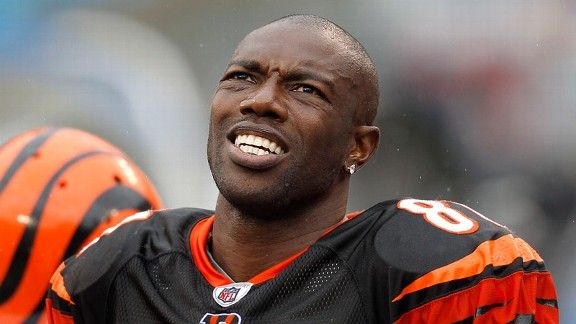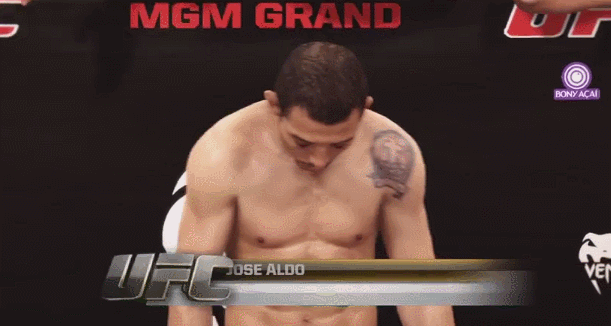It would be pathetic if it weren't so terribly sad. A broke Terrell Owens went on Dr. Phil's show to face the mothers of three of his children and discuss why he is not more involved in their lives and has stopped paying child support. The episode aired Tuesday.
Owens doesn't see any of his four kids -- two sons and two daughters by four women -- with any regularity because, he said, his schedule doesn't allow it. He doesn't send Christmas presents. He doesn't call on their birthdays. Until recently, he didn't do anything but pop in occasionally on short notice and send money at the beginning of the month.
The monthly tab, at its peak, according to Owens: $50,000.
After 15 years as a star in the NFL, Owens has a part-time job as a wide receiver in an indoor football league few know anything about. Owens would love to play in the NFL again, and collect a fat check. As is often the case with players at the end of their careers, Owens is still chasing the ghost. He thinks he can still play, even though no team either wants him or is willing to put up with all that goes with bringing Owens into the fold.
Of course, Owens told Dr. Phil it was the media's fault he couldn't land with another team. The perception of Owens doesn't match the real thing, he said. When all else fails, blame the media.
So this is Owens' transition from NFL star to Regular Joe. Suffice it to say, it doesn't seem to be going very well.
Leaving the NFL, as we've become all too aware of recently, can be brutally tough, especially for the highest-profile players with the longest, most accomplished careers. In their minds, it is never time to hang up the cleats. They always have more in the tank. A star at 75 percent is better than just about everyone else in the league at 100.
That is how their minds work. They wouldn't have become great players otherwise.
In most cases, the player is always the last to know. And when it ends, a harsh reality sets in. No more spotlight. No more adulation. No more games on Sundays. No more having an outlet for aggression. No more camaraderie in the locker room. No more fun.
Going from being a player to being a retired player means becoming something you've never been: just a guy. Some handle it better than others. Earlier this week, Matt Light retired after an 11-year career as an offensive lineman with New England. He is 33 and has Crohn's disease and said he wanted to retire while his body is still relatively intact so he can spend time with his wife and three kids.
Light seemed like he was ready to begin his transition. Even after a year on the sideline with no takers, Owens doesn't seem willing to concede that his transition has already begun.
He is chasing, and it is sad. It is sad that Owens' father lived across the street from him when he was a child and his father wasn't involved in his life. It is sad that Owens was raised by a strict, almost paranoid grandmother and that he didn't see his mother much because she worked two jobs.
It is sad that Owens says he has lost all of the money he earned. He told Dr. Phil he didn't know how much it was, but there's been speculation the number is between $80 million and $100 million, and Owens didn't deny it.
And it is incredibly sad that, after growing up without a father, Owens apparently is an absent father himself.
"This is not an ideal situation having four kids by four different women," Owens told Dr. Phil.
We should be talking about Owens' stellar career and counting down to his Hall of Fame induction. The man was one of the most gifted, physically fit players of his time. He is second in league history with 15,934 receiving yards, tied for second with 153 touchdowns, and sixth with 1,078 catches.
But after scorching the earth in San Francisco, Philadelphia and Dallas before playing out a couple relatively tame seasons in Buffalo and Cincinnati, Owens won't get much sympathy. He probably won't get much support, either.
"I don't have no friends," Owens told GQ a couple of months back. "I don't want no friends. That's how I feel."
No friends. No money. Four women raising his four children.
The transition is hard enough.
"When you choose professional athlete as a profession," Cris Carter told ESPN Radio's Scott Van Pelt on Tuesday, "you have to have a Plan B profession."
And even if you do, Carter said, it is very, very difficult.
Maybe Owens has a Plan B -- reality TV star, perhaps? -- but he is still focused on Plan A. That is his choice. A couple of days ago for the Allen Wranglers, he had six catches for 76 yards and one touchdown in a 73-9 win over the New Mexico Stars.
It's hard to have sympathy for a guy who made a lot of money, lost it all and torched teammates and franchises along the way. But things can unravel quickly when the lights go off.
"I have sympathy for any human being who is going through what he is going through, because obviously that wasn't his plan," Carter said of Owens.
It doesn't seem like Owens has a viable plan. Watching him on Dr. Phil, unable to look at the mothers of his children but emotional when discussing the death of his grandmother, I felt something for Owens I never thought I would: sympathy, and sadness. For someone who had such a brilliant career, he looked so lost.
Owens doesn't see any of his four kids -- two sons and two daughters by four women -- with any regularity because, he said, his schedule doesn't allow it. He doesn't send Christmas presents. He doesn't call on their birthdays. Until recently, he didn't do anything but pop in occasionally on short notice and send money at the beginning of the month.
The monthly tab, at its peak, according to Owens: $50,000.
After 15 years as a star in the NFL, Owens has a part-time job as a wide receiver in an indoor football league few know anything about. Owens would love to play in the NFL again, and collect a fat check. As is often the case with players at the end of their careers, Owens is still chasing the ghost. He thinks he can still play, even though no team either wants him or is willing to put up with all that goes with bringing Owens into the fold.
Of course, Owens told Dr. Phil it was the media's fault he couldn't land with another team. The perception of Owens doesn't match the real thing, he said. When all else fails, blame the media.
So this is Owens' transition from NFL star to Regular Joe. Suffice it to say, it doesn't seem to be going very well.
Leaving the NFL, as we've become all too aware of recently, can be brutally tough, especially for the highest-profile players with the longest, most accomplished careers. In their minds, it is never time to hang up the cleats. They always have more in the tank. A star at 75 percent is better than just about everyone else in the league at 100.
That is how their minds work. They wouldn't have become great players otherwise.
In most cases, the player is always the last to know. And when it ends, a harsh reality sets in. No more spotlight. No more adulation. No more games on Sundays. No more having an outlet for aggression. No more camaraderie in the locker room. No more fun.
Going from being a player to being a retired player means becoming something you've never been: just a guy. Some handle it better than others. Earlier this week, Matt Light retired after an 11-year career as an offensive lineman with New England. He is 33 and has Crohn's disease and said he wanted to retire while his body is still relatively intact so he can spend time with his wife and three kids.
Light seemed like he was ready to begin his transition. Even after a year on the sideline with no takers, Owens doesn't seem willing to concede that his transition has already begun.
He is chasing, and it is sad. It is sad that Owens' father lived across the street from him when he was a child and his father wasn't involved in his life. It is sad that Owens was raised by a strict, almost paranoid grandmother and that he didn't see his mother much because she worked two jobs.
It is sad that Owens says he has lost all of the money he earned. He told Dr. Phil he didn't know how much it was, but there's been speculation the number is between $80 million and $100 million, and Owens didn't deny it.
And it is incredibly sad that, after growing up without a father, Owens apparently is an absent father himself.
"This is not an ideal situation having four kids by four different women," Owens told Dr. Phil.
We should be talking about Owens' stellar career and counting down to his Hall of Fame induction. The man was one of the most gifted, physically fit players of his time. He is second in league history with 15,934 receiving yards, tied for second with 153 touchdowns, and sixth with 1,078 catches.
But after scorching the earth in San Francisco, Philadelphia and Dallas before playing out a couple relatively tame seasons in Buffalo and Cincinnati, Owens won't get much sympathy. He probably won't get much support, either.
"I don't have no friends," Owens told GQ a couple of months back. "I don't want no friends. That's how I feel."
No friends. No money. Four women raising his four children.
The transition is hard enough.
"When you choose professional athlete as a profession," Cris Carter told ESPN Radio's Scott Van Pelt on Tuesday, "you have to have a Plan B profession."
And even if you do, Carter said, it is very, very difficult.
Maybe Owens has a Plan B -- reality TV star, perhaps? -- but he is still focused on Plan A. That is his choice. A couple of days ago for the Allen Wranglers, he had six catches for 76 yards and one touchdown in a 73-9 win over the New Mexico Stars.
It's hard to have sympathy for a guy who made a lot of money, lost it all and torched teammates and franchises along the way. But things can unravel quickly when the lights go off.
"I have sympathy for any human being who is going through what he is going through, because obviously that wasn't his plan," Carter said of Owens.
It doesn't seem like Owens has a viable plan. Watching him on Dr. Phil, unable to look at the mothers of his children but emotional when discussing the death of his grandmother, I felt something for Owens I never thought I would: sympathy, and sadness. For someone who had such a brilliant career, he looked so lost.









Comment